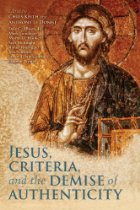 I touched on one brief passage in the chapter by Jens Schröter in my recent post, Historical Jesus Studies ARE Different Methodologically from Other Historical Studies, and it’s now time to return to his chapter from Jesus, Criteria, and the Demise of Authenticity [JCDA] in more depth. Jens Schröter appears at several points to come so close to advocating use of the methods of other historical studies for the study of Jesus, but each time falls agonizingly short of what only those with eyes wide shut will miss.
I touched on one brief passage in the chapter by Jens Schröter in my recent post, Historical Jesus Studies ARE Different Methodologically from Other Historical Studies, and it’s now time to return to his chapter from Jesus, Criteria, and the Demise of Authenticity [JCDA] in more depth. Jens Schröter appears at several points to come so close to advocating use of the methods of other historical studies for the study of Jesus, but each time falls agonizingly short of what only those with eyes wide shut will miss.
Introduction
Historical Jesus research in recent decades has dwelt heavily upon the social, political and religious life of Judaism, Palestine and Galilee in the first century in order to explore the environmental factors that must have contributed to the personal make-up of Jesus and his mission.
A historical presentation of Jesus’ mission has to explain why it caused a new movement circled around his name and venerating him as “Lord Jesus Christ.” . . . . (p. 49, my bolding here and in all quotations)
Right here is the first problem of historical Jesus studies. Recently Larry Hurtado even declared that part of this proposition — that a new movement erupted from Palestine in the 30’s — was “data”* that the historian was required to explain.
But that is not data. What is data is the existence of narratives — the Gospels of Matthew, Luke, John and the Book of Acts — portraying a faith movement spreading from Palestine in the 30s. But narratives are not necessarily history.
Nor do we have any data to confirm that there was a Jesus mission in Palestine that caused a new movement. The data we have are stories about such a Jesus mission. But stories are not necessarily history.
- Question: How can we know if a story is based on history?
- If a story begins with, “This is a true story”, is that enough to rely upon?
- What if the tale is told from the perspective of an all knowing authoritative narrator who speaks with authority. Is that the clue?
- What if the tale is plausible and coherent and “rings true” — that is, is rich in verisimilitude? Is that a sure sign it really is true?
- How many biblical scholars have ever stopped to think through questions like these in relation to historical figures (ancient, medieval and modern) generally?
- Answer: We need some evidence external to the story itself that confirms for us that there were real events and persons upon which the story was based. For example: Continue reading “Historical Method Versus Jesus Research. Chapter 2 of Jesus, Criteria, and the Demise of Authenticity”
